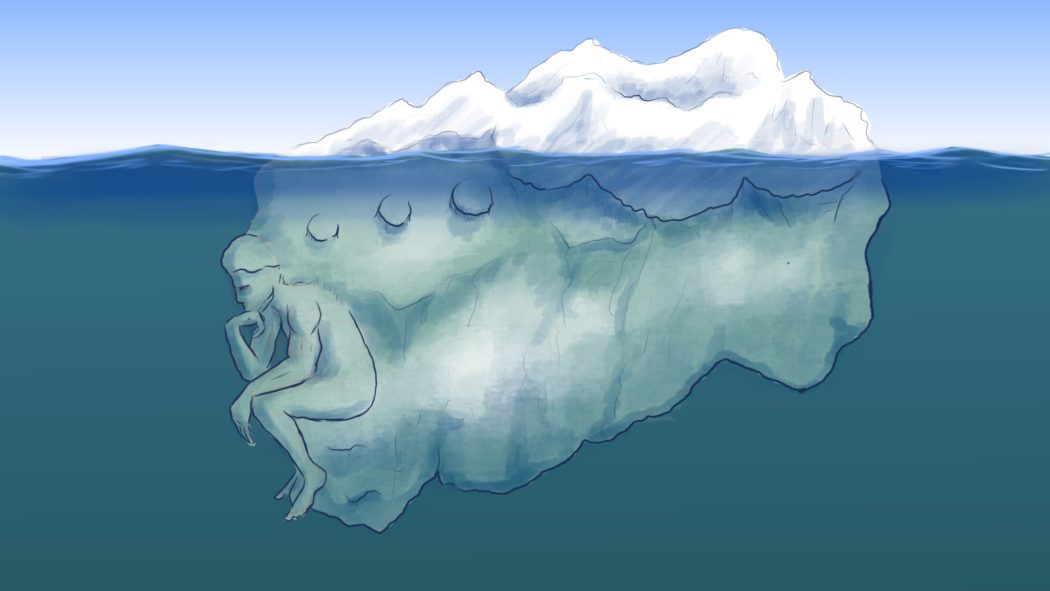Opinion: States of mind and matter
Water is the essence of life for almost all living things on earth. Most of our systems need it to function properly, we use it to prepare our food, to clean ourselves and much more. It’s really amazing that something as simple as two hydrogens and one oxygen bonded together can have so many essential uses.
However, I think the most incredible feature of water is its ability to change.
Rivers find the best and most efficient way to move across the land, the ocean changes its tides based on the influence of the moon, and even the water we carry around in our water bottles effortlessly fits the shape of whatever container you place it in.
I’m a science person, so I understand the molecular explanation behind why the properties of water work the way they do, but I often wonder: if water had a memory, or sentience, like we do if it would alter the way it behaves.
If it could remember the shape of a bottle, would it still shift so easily to the shape of a pot? If it could remember being used for processes in a dinosaur, would it still have no problem being manipulated for our body processes? Or would it still be free-flowing and, with ease, become whatever it needs to be?
Like water, people have a multitude of different experiences in their lifetime. Unlike water, people have memory. And memory seems to be both the salvation and hindrance of humanity.
Memory forces people to assume the properties of a solid. We become stuck in our ways and so caught up in the shape of our last experience that we can’t mold ourselves to a new one.
Memory tells us what the outcomes of our previous decisions have been. Based on these previous experiences and the emotions attached to them, we make our decisions.
For the most part, this is extremely practical. Memory is what helps us to conclude that we shouldn’t touch a hot stove, or that we should get eight hours of sleep before a big test.
However, our memory sometimes makes us biased because it forces us to see everything in the shape of our previous experiences. It makes us associate things that shouldn’t be associated and apply things that shouldn’t be applied. It’s like trying to put on an old sweater that you outgrew — it doesn’t fit because things are different and trying to force it to fit will be frustrating, liable to break the sweater, and might hurt you.
While it’s easy enough to find clothing that fits, how do we alter our perspectives? How do you become something new if, subconsciously, all the decisions you make today are based on a decision that you made yesterday?
I’m sure that there are many different answers to this question. My answer is simple: it requires a change of state.
When someone says the word ‘water’ people automatically think of it in its liquid form. But water also has a restrictive solid form, which is commonly known as ice.
To change ice into liquid water, all you have to do is apply some heat. You have to make the molecules feel so uncomfortable, that they are forced to cast off their solid form to become something much more adaptable.
Similarly, to change the state of one’s perspectives you have to apply discomfort.
This might be about where most people stop reading. No one wants to be uncomfortable. Simply glancing at the daily life of most Americans tells us that comfort is a high priority.
Certainly, there’s nothing wrong with wanting to be comfortable, but there’s a time and place for everything. Like the saying goes, nothing ever grows in the comfort zone.
In other words, change requires discomfort. To see other people, ourselves, and the world around us with new eyes, we have to be, at least a little, uncomfortable.
But please don’t misunderstand me. There is something to be learned from every experience, and we should remember them all. The development of memory is what allows people to learn.
But sometimes we hold on so tightly to what we have learned previously that we don’t leave room to learn new things. Just as bodies of water that aren’t in constant motion often become overgrown with algae and other unpleasant things, so, too, do we also become polluted by not letting go and moving on.

Emeline Haroldsen is a dual Mathematics and Biochemistry major. She’s originally from Maryland and she enjoys most forms of physical activity, playing the piano, and completing her homework on time.
emeline.haroldsen@usu.edu

